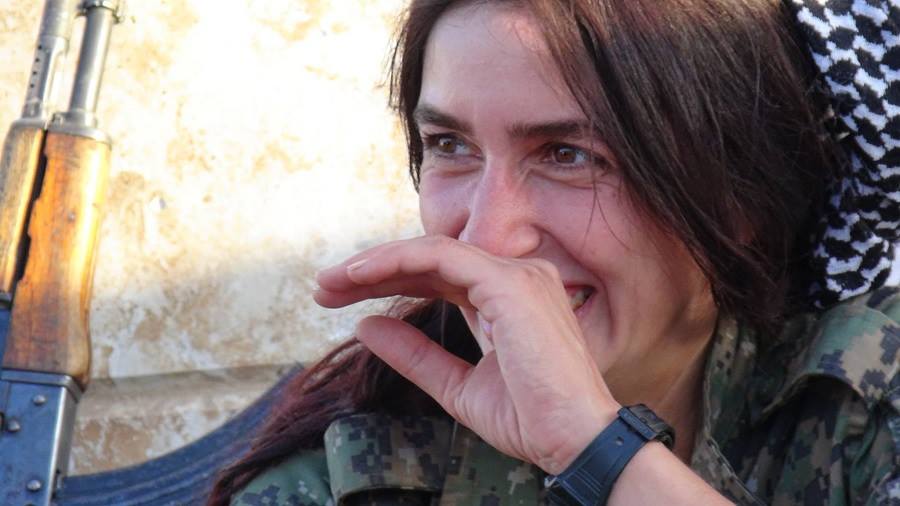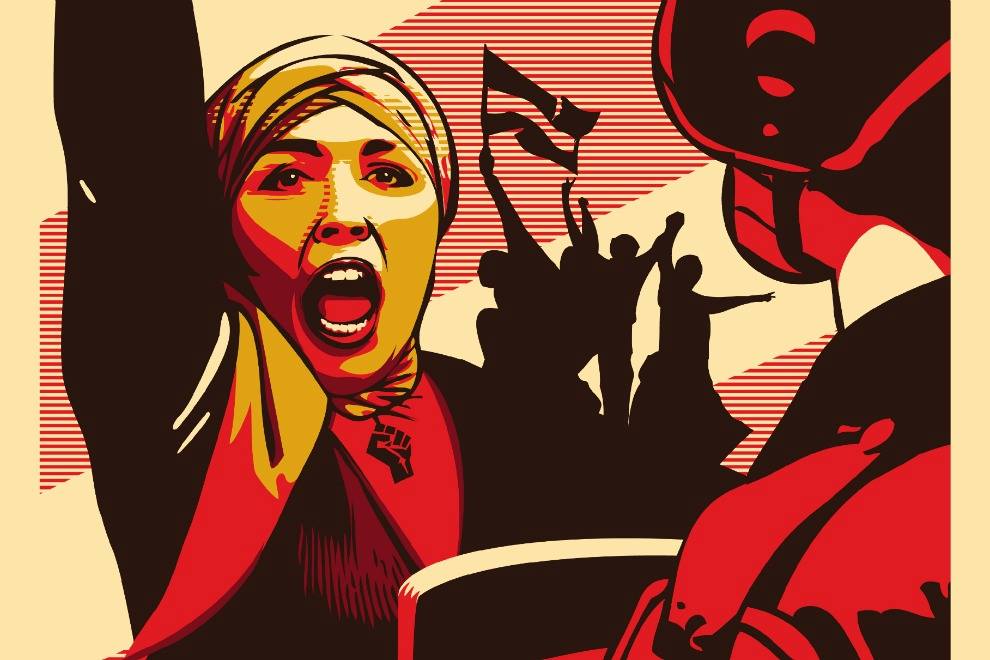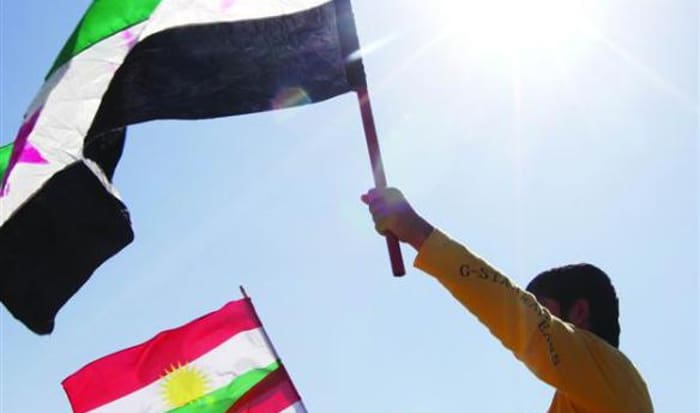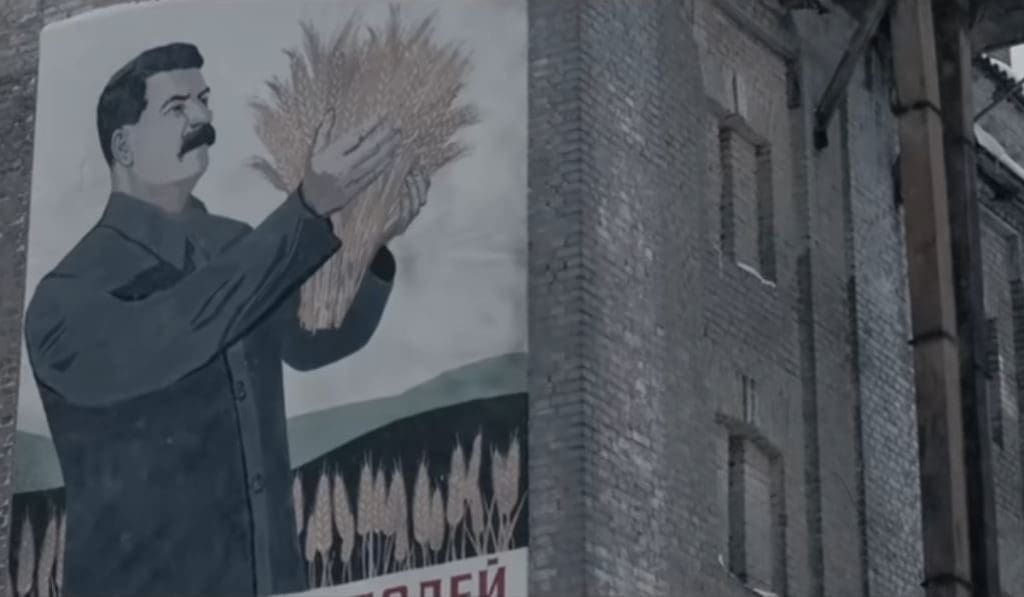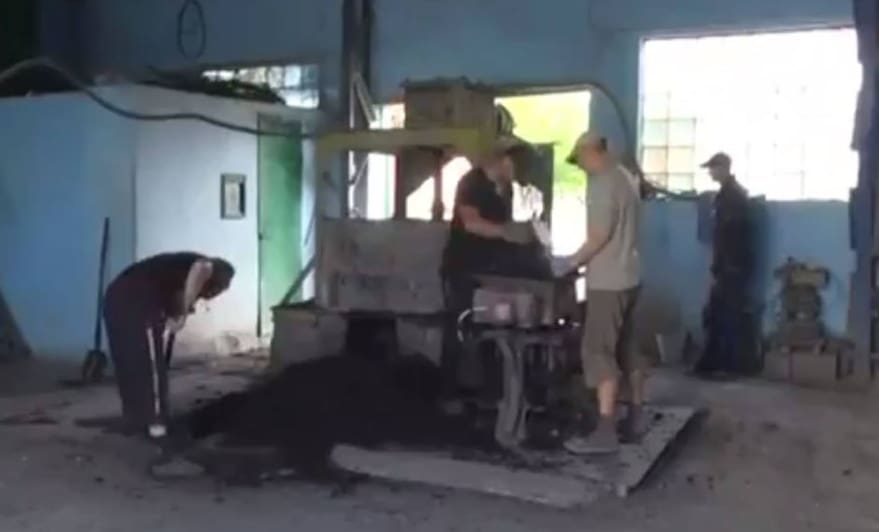AntiNote: This article first appeared in Jacobin Magazine. Reprinted with permission.
All parties to the collaboration which brought this article to English-language readers were conscious and wary of the anti-imperialist/anti-anti-imperialist sideshow currently preoccupying parts of the Western Left, and we expected to hear from these quarters. We were not disappointed. Some of the article’s critics, who complained that Babacan and Çakır do not make concrete proposals, can be dismissed immediately for reasons apparent to anyone that reads the article in its entirety. In more urgent need of response are allegations of propagandizing—that the social structures in Rojava are described too glowingly and that the righteousness of the PYD and PKK is not sufficiently interrogated.
Fair enough. The AWC’s initial reaction to these jabs (and the authors surely have their own) is that in situations as complex, fluid, and violent as either the Syrian civil war or the Kurdish struggle for self-determination—which happen to overlap here, wonderful—accusations of propagandizing can be leveled at any of the information flowing from any source with an obvious stake in the conflict. More specifically, the equally propagandistic claims that the PYD is guilty of repressing Rojava’s population or that the Kurdish Movement is ‘on Assad’s side,’ have not been substantiated to the extent that Babacan and Çakır’s contrary claims have been, and certainly not to our satisfaction at the AWC.
(To deflate this entire argument, though, we suggest turning our critical attention to this week’s article by Syrian revolutionary-in-exile Yassin al-Haj Saleh, and thus on ourselves.)
Finally, in the month since this article’s publication in English the situation in Kobanê has continued to evolve. We have updated the language in a few places to reflect this, though a full appreciation of the ultimate liberation of the city, confirmed only last week, is necessarily absent. Babacan and Çakır’s calls—especially for the opening of an aid corridor through Turkey—are, however, no less relevant as the city rebuilds and its inhabitants begin to return.
We have also not reproduced Jacobin’s link citations or, regrettably, their accompanying photo essay. Both can be found and enjoyed in the original.
The False Friends of Kobanê
by Errol Babacan and Murat Çakır
The significance of the struggle in Kobanê cannot be overstated. But real international solidarity won’t come in the form of military intervention.
For nearly five months, heavily armed Islamic State (IS) militants laid siege to the city of Kobanê in Syrian Kurdistan (Rojava).
Another IS massacre was initially feared. But the homegrown defense units of Kobanê, despite being hopelessly outmatched militarily, were able to repel IS incursions for a surprisingly long time — and for much of this time without help. It was a pitched battle that repeatedly saw bitter house-to-house fighting.
However, with the questionably timed expansion of military assistance from the United States and the opening of Turkish territory to Peshmerga forces from Iraqi Kurdistan, the tide appeared to turn. The close fighting within Kobanê has ended, though the surrounding countryside remains occupied by the IS.
After a wave of solidarity demonstrations for Kobanê all across Europe in October and November, international attention on the region noticeably abated with the arrival of the Peshmerga reinforcements. Nevertheless, the situation is still militarily and politically complex, and the battle over Kobanê remains in part a battle over the appropriate means of international solidarity.
The debate about what practical, concrete form this solidarity should be taking has not been settled. At an early stage of the fighting, some parliamentarians from Germany’s Die Linke — despite the party’s long-standing rejection of military interventions — proposed an international operation with a United Nations (UN) mandate. As Die Linke’s parliamentarians rushed ahead, a skeptical German public found itself again asking where it should stand regarding international military operations.
At the same time, UN General Secretary Ban Ki Moon called on those who could protect the civilian population of Kobanê to do so. This raised additional questions, not only about who exactly could respond to such an appeal, but also about how realistic it was to hope for a military intervention whose primary objective would be the protection of civilians and not the pursuit of power. In the face of a spreading wildfire, care has to be taken not to call for aid from those who set the fire in the first place and then doused it with gasoline.
The Role of Turkey
The planned intervention of Turkish ground troops has been among the more dubious propositions. This was, in any case, purported to be a controversial plan; France had declared its support for the establishment of a buffer zone by Turkey, while Great Britain and the US rejected this proposal, at least in public.
Given that IS militants have reportedly been crossing the Turkish-Syrian border with ease, and in the context of Turkey’s longstanding hostility to Kurdish interests, it was clear that such a plan would amount to the fox guarding the henhouse.
The transformation of public opinion in Germany is also noteworthy. A few weeks before the IS militants’ attack on Kobanê started, the overwhelming consensus in the German media was that Turkey was actively supporting the IS assailants. Then all of a sudden, Turkey stopped being regarded as an active participant in the conflict on the side of the IS, but rather as a concerned observer — accused of only inaction or incompetence. Turkey had mobilized heavy armor on the border, but had not “gone in.”
Indeed it was not only the media that appeared suddenly to view the role of Turkey more charitably. Even some Kurdish politicians appeared to be nursing positive expectations. The co-chair of the Syrian Kurdish Party of Democratic Unity (PYD), Salih Müslim, explained it thus: in talks with Turkey, he had been promised that a corridor along the Syrian-Turkish border would be opened to allow aid to reach the besieged city from Kurdish regions further east in Syria.
Trusting in this same promise, the Kurdish movement in Turkey publicly declared it would refrain from further mass mobilizations and unflinchingly affirmed its commitment to the so-called peace negotiations with the Turkish government.
Precious time flew by. The siege tightened around the city, and the promise of an aid corridor remained unfulfilled.
Since it was perfectly clear that Turkey had no intention of making any concessions on behalf of Kobanê, the Kurdish movement declared the peace talks a failure. Together with left organizations, it brought hundreds of thousands of people onto the streets, and demanded that the Turkish government open the border to volunteers bringing medical and logistical help.
Turkey nonetheless prevented such aid by launching violent police operations against the thousands of people holding daily vigils at the border. The government also reacted to the mass protests with police violence, aided by armed Islamist gangs. Many provinces in eastern Turkey were placed under curfew for the first time in over ten years. In just one day (October 8), hundreds of protesters were injured, and over a dozen were killed.
Contrary to statements of Turkish government officials, the Kurdish movement does not deserve the blame for this escalation and the ensuing collapse of peace negotiations. It is the Turkish government itself that has been responsible for ratcheting up conflict in its own country, as well as in neighboring ones.
Nonetheless, the question persists why this kind of credulousness about the intentions of Turkey keeps surfacing. Turkey’s active prevention of aid contradicts any private promises made — as well as the public utterings of Turkish Prime Minister Ahmet Davutoğlu that “Kobanê will not fall.” This alone should be enough to erase any doubts about the Turkish government’s true nature.
Hostility toward Rojava
The supposition that Turkey might have any interest in intervening against the IS on behalf of the people of Kobanê turns on its head the entire character of recent years’ political developments between the Turkish government and the Kurdish movement.
Indeed, Turkey’s hostility to Rojava is intimately bound up in its own strategic goals — preserving regional influence as well as territorial sovereignty — and in Rojava’s apparent alignment with a domestic resistance that has historically threatened these goals. A cursory review of the background of this relationship should suffice here.
Shortly after the onset of demonstrations against the Syrian government in 2011, the PYD began to construct autonomous governing structures in the majority-Kurdish regions of northern Syria, and to assemble self-defense forces (YPG/YPJ) among citizens.
The PYD had previously made known that its activities were independent of the wider Syrian opposition. When the latter began conferring with Turkey and, with Western support, took up arms against the Syrian government and started calling for foreign military intervention, the PYD spoke out against such outside intervention and stressed that a democratic Syria could only be the collective project of all Syrians.
Under the leadership of the PYD, democratic council structures were erected in three regions (Afrin, Kobanê, and Cizirê) that are referred to as cantons. The governing assemblies as well as the self-defense forces are characterized by gender quotas and representation of all populations according to ethnic and religious identification (Kurdish, Arab, Assyrian Christian). Town, neighborhood, city, and regional councils invite and receive active participation from the population in decision making.
Democratically decided price controls, a constitutional justice system, and free schooling in any student’s mother tongue are additional distinguishing features of Rojava’s egalitarian structures. Under exceedingly adverse conditions, the region has managed to sustain its people on the basis of self-organized production collectives.
At the outbreak of civil war in Syria, Rojava’s representatives did not merely reject outside military intervention. In negotiations with the Syrian opposition, they also argued for the autonomy of the Kurdish region in a possible future Syria. The Syrian opposition organized under the umbrella of the Syrian National Council categorically rejected both these stances.
Representatives of Rojava were thereafter increasingly isolated by the opposition and its supporters, the so-called “group of friends of Syria.” This isolation was accompanied by an economic embargo that has been enforced by Turkey and the government of the autonomous Kurdish region of Iraq (Kurdish Regional Government, or KRG).
The Turkish government, for its part, declared it would not tolerate this “terrorist formation” on its border, holding it as identical to the Kurdistan Workers’ Party (PKK), against which it has waged a long-term campaign of repression with US support. And rivalries within Rojava between smaller Syrian-Kurdish parties and the PYD, the leading party, ruptured relations with Iraqi Kurdistan.
The smaller parties drew nearer to the KRG in time and jointly accused the PYD of monopolizing political power. Though the social footholds of these parties in Rojava were small, the discord between them and the PYD became a pretense for the KRG, in association with Turkey, to weaken Rojava by any means.
While Rojava was busy with the attacks of IS militants, the KRG built up its border to Rojava and tightened controls there. Even the delivery of urgently needed medical supplies was blocked.
A league against Rojava began forming early on, and it has only been bolstered by the advance of militant groups supported by Saudi Arabia, Qatar, and Turkey. Though fighters from these outfits move freely back and forth across the Syrian-Turkish border, passage has been denied to refugees from Rojava at both the border to Turkey and the border to northern Iraq. The strategy is clear: starve Rojava.
Destroying Democratic Autonomy
What explains this aggression? For the Turkish government, Rojava represents a threat on multiple levels.
First of all, Rojava’s democratic autonomy model functions as an example to the Kurdish population within Turkey itself. The cantons have declared that the natural resources of Rojava will remain the collective property of the region’s people, and any potential revenues from them will be invested back into the people. The egalitarian council structures and the collectivization of resources stand diametrically opposed to the confessional conservatism of the ruling Justice and Development Party (AKP) and its neoliberal politics.
Furthermore, Rojava is an obstacle to Turkey’s ambitions to expand its regional influence. The strategic and economic orientation of Turkey is fundamentally at odds with Rojava’s project. Thus the entire prehistory of the conflict contradicts the expectation that the Syrian-Kurdish people might receive support from Turkey.
This plays out similarly in relation to the KRG. Self-organized production collectives, progressive gender politics, and democratic council structures also stand opposed to the basic orientation of the oil-rentier proto-state in northern Iraq — though nearly all commentary on the current situation might suggest otherwise.
If that weren’t enough, Rojava and Kobanê in particular have a strategic significance for the IS. Should Kobanê have fallen fully into the hands of IS, it would have been even easier for the group to recruit from Turkey, as well as smuggle arms and other goods. In addition, Kobanê is in the middle of the three cantons geographically. The other two cantons would be completely dislocated from one another without Kobanê, and their defense against further attacks by the IS or other militias would be much more difficult.
Turkey is attempting to exploit this situation and instrumentalize the IS offensive in order to make Rojava into an international issue. Davutoğlu’s publicly declared conditions — to only support the use of US military bases in Turkey and US ground troops against the IS if the fall of the Syrian government is also a goal — are revealing.
He could not say it any more clearly: the IS advances and the murder of Syrians within sight of the Turkish border do not provide sufficient motivation to act, even in the form of the relatively minor concessions demanded by the Kurdish movement.
The contents of the Turkish War Authority bill, recently passed by the Turkish parliament, are shaping this reality. In that document, the PKK — for Turkey, the same thing as Rojava — and the IS are both named, in the same breath, as “terrorist organizations.” Still, faced with a choice between the PKK/ Rojava and the IS, the Turkish government’s preference for the latter is clear.
Did the Strategic Winds Change?
Turkey and the KRG have purposely weakened and isolated Rojava. Consequently, they have exposed Rojava to attack by the IS and other affiliated militias. The notion that the very same powers that helped create this situation should rush to Rojava’s aid is absurd. So what conclusions can we draw from the expansion of military assistance from the US and the opening of Turkish territory to the Iraqi-Kurdish Peshmerga?
The US stepped up its bombing in and around Kobanê just as immense international sympathy was emerging for the embattled city, especially the photogenic warriors of the Women’s Protection Units (YPJ). But before that, the US had made its indifference toward Kobanê all too explicit, even while knowing what the city and the countryside around it was facing. So the late expansion of its anti-IS operations to include Kobanê raises questions.
Were appeals to the United States and other forces to come to Rojava’s defense fruitful? This idea — widely shared even on the Left — resonates with the common assumption that the US, which will support or fight either dictatorial or democratic governments based entirely on its own narrow interests, is capable of turning on a policy dime in the Middle East. Islamist militias, which sometimes act under the umbrella of the Free Syrian Army (FSA), have received support from the US and its partners as long as they appear to be fighting the Syrian government.
The real reasons for these shifts remain unclear. It is perhaps conceivable that the US had to react to public pressure, but other questions persist. Why weren’t more arms delivered directly to the people’s self-defense forces (YPG/YPJ)? Why didn’t the US and other NATO members use their influence with Turkey to force policy changes that have been hemming in Rojava? How does it compute that the same Peshmerga that helped militarily impose an economic embargo on Rojava, and closed its section of the Syrian-Iraqi border to refugees from the region, has now hurried to Rojava’s aid?
Yes, Turkey opened a passage to the Peshmerga, and the US coordinated its much-belated bombardment with the defense units of the YPG. It is nevertheless important to note that neither the US nor any other country has taken concrete steps to fulfill the actual demands Rojava has made that its autonomous defense be made possible.
Arms drops from the air had been floated but not meaningfully pursued after allegations that an initial drop ended up in the hands of IS fighters. Instead, hope was pinned on the Peshmerga and FSA units.
There has been no sustained pressure on NATO-member Turkey to open a corridor for reinforcements from Rojava’s own self-defense forces further east. There is still broad agreement, though largely unspoken since October, that Turkey is supporting militias by offering them space for regrouping and recruiting; this continues without consequence.
Meanwhile it has recently come to light that, while the IS was escalating its attacks, negotiations took place in the northern Iraqi city of Dohuk between quarreling Syrian-Kurdish parties, mediated by the KRG. It is in connection with these negotiations that the Peshmerga was sent to Kobanê. The precise substance of the negotiations has not been made public, and the negotiating partners have made contradictory statements.
Their statements nonetheless match in one way: that an agreement was arrived at regarding the distribution of political power in Rojava; that rivalries were overcome, and “Kurdish Unity” reestablished. A coordinating council will be formed, of half PYD and half KRG-associated parties. But what function or authority this council will have remains unclear.
The PYD has declared this must be discussed among the cantons of Rojava. KRG-associated sources have declared, however, that this coordinating council will function as a central government and stands above Rojava’s cantons — whose status will in turn be degraded to “provinces.” It has also been reported that the KRG-associated parties registered “concerns,” as yet unspecified, about Rojava’s social contract.
These scant murmurs trickling out of Dohuk serve as reminders that real aid is bound to conditions fundamentally disruptive to Rojava’s democratic and emancipatory project. The installation of a hostile central government would mean the end of hard-won federal and democratic self-government in Rojava.
The government of Iraqi Kurdistan, which is tightly linked to the US both presently and historically, and just struck a giant oil deal with Iraq’s central government, has now also gained a strong political foothold in Rojava. Exactly which parts of Rojava’s social contract will be contested and perhaps be undone will, for the time being, depend in large part on the strategic disposition of Iraqi Kurdistan.
The people of Rojava, therefore, can plainly not expect substantial aid from other states without abandoning their own achievements.
It is doubtful that the defeat of Rojava is among the US’s main goals in the region. Still, the US is surely no friend of Rojava, which has recoiled at all attempts to instrumentalize it in the course of trying to topple the Syrian government. The Americans certainly have no sympathy for the politics on the ground in Rojava. Only joining some loose alliance against the IS has given them reason to send support. But this reason alone appears too weak to fully overrule the interests of US allies in the region, Turkey and the KRG in particular.
That a NATO member would step in at the Turkish-Syrian border — against the wishes of another NATO member, in aid of Rojava — is inconceivable. The strategic partnership between the West and the KRG, only recently expanded, further diminishes any hopes the people of Rojava may have that their rescue will come on humanitarian grounds from the West.
The broad mobilization in Turkey in October was intended to raise the domestic political price of an eventual defeat of Rojava and to produce concessions from the AKP. One important goal of these protests, at least, was attained: preventing Turkey from establishing a “buffer zone,” which would have been tantamount to a military invasion of Rojava.
However, the imposition of curfews, the mobilization of the military in many cities including Istanbul, the shooting of demonstrators, and the encouragement of armed fascist militias have also shown that the Turkish government will go to extremes. At a suitable opportunity, Turkey may even reconsider installing a buffer zone.
International Solidarity
In light of all this, and after the recent series of uprisings in North Africa and the Middle East, which for a variety of internal and external reasons have not produced what leftists had hoped, the significance of Rojava from the perspective of the international left cannot be overstated.
The citizen council-governed cantons are showing the entire Middle East that it is possible to build a peaceful, democratic, and social justice-oriented self government that transcends cultural differences. Rojava presents an alternative to the ethnic and confessional polarization endemic in the region. That such a model has, at least up to now, been able to survive primarily through its own self-defense forces — in other words, without imperialist protection — is special to say the least.
Still, it is apparent that the continued existence of Rojava cannot be ensured without international solidarity, the more so as US military assistance and the KRG’s involvement both seem to be bound to fundamental concessions that would curtail the most emancipatory aspects of the model.
But what kind of “solidarity” can we practice from the West? In Germany, a start would be to confront the calls by some left parliamentarians for a UN-mandated military intervention. Considering the manifest divisions in the Security Council, these calls are no more than symbolic anyway. Since such a UN mandate is plainly unlikely to come about, the only remaining effect of these calls is to damage, once again, Die Linke’s basic peace platform.
Demands from other quarters for arms shipments to Rojava also do not constitute solidarity with Rojava, if we are coming from the perspective of a politics of peace.
Without a doubt, of course, calls out of Rojava for military aid, considering the all-or-nothing war there, are understandable. This may seem contradictory. But the problem for peace-platform politicians in Germany is a different one.
Can the German left guarantee that the “avenue of legitimacy” they are opening for (both German and non-German) foreign military operations and arms shipments will serve the “right” purposes? Since the current political balance in Germany doesn’t permit Die Linke any of the power necessary to control military operations or arms shipments, the answer must be no.
One example of this in the very recent past: when the Yezidi people in the Iraqi Sinjar mountains were facing slaughter by the IS, they were left completely unprotected by the Peshmerga and the KRG.
The forces from Rojava and the PKK that rushed in to help were exactly those whose already long struggle against the IS had been actively weakened by the KRG. Although the unspeakable role of the KRG lies open for all to see, it was the KRG that was lauded as the Yezidis’ savior and received German arms shipments in contravention of German laws and the UN Charter.
As long as the KRG is thus encouraged and empowered in its political orientation towards Rojava, no one can guarantee that these new arms won’t some day be pointed at Rojava or the PKK.
Therefore, instead of working for military intervention and arms shipments — the implementation of which they cannot meaningfully influence — the German left could demand that the doings of NATO-member Turkey be exposed for what they are: the intentional delivery of the people of Rojava into the hands of the IS.
The units of the YPG/YPJ have declared that they can, together with the PKK, manage the defense of Rojava on their own. Still, Turkey has to open a corridor through its territory for military resupply and logistical resourcing, and abandon its de facto support of the IS. The lifting of Turkey’s embargo on Rojava also has yet to be attained.
The German government and other Western governments must be pressured to force their NATO partner Turkey to end both its proxy war in Syria as well as its repression of political protest. Western leftists could also work for goals such as the removal of foreign soldiers (as well as Patriot missiles) stationed in Turkey and demand sanctions against Turkey if it continues to support the IS. Finally, military intervention by Turkey or other imperialist forces must be adamantly rejected, whereas a more skeptical stance towards Western governments’ goals in the region is needed.
Campaigns for an end to arms shipments to all actors in the region and for massive increases in refugee aid are among the most important concrete projects peace-oriented leftists should be working on.
Translated by Antidote
Featured Image Source: Rojava Breaking News (Facebook)

